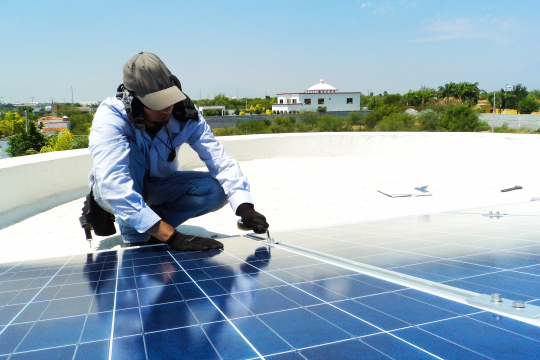Access to energy has been called a “golden thread” running through multiple development goals related to economic growth, environmental quality, and social equity. Therefore, it is no surprise that energy access is part of the ambitious blueprint for a sustainable future laid out in Agenda 2030, in Sustainable Development Goal 7: Access to affordable, reliable, sustainable, and modern energy for all.
Creating a successful and sustainable energy transition requires policymakers to understand what works and what doesn’t. But while the concept of evidence-based policymaking has wide support across the sustainable development community, translating it into practice is difficult due to the sheer volume of academic studies and evaluations of projects, programs, and policies scattered across multiple disciplines. What lessons can be drawn from all this research, and how does the current state of the evidence base match policymakers' practical needs?
Evaluated 80,000 articles
To help answer these questions, researchers with EfD’s Sustainable Energy Transitions Initiative (SETI) conducted a systematic review of the research literature on energy transitions, evaluating nearly 80,000 academic articles related to the social dimensions of energy and development. The effort brought together 24 researchers from multiple institutions, including Duke University and eight EfD centers. After an initial screening, a relevant subset of 3,000 quantitative papers was identified for detailed analysis and coding.
Systematic reviews assess existing studies using repeatable analytical methods to produce rigorous characterizations of the state of the existing literature. In this case, studies were coded based on energy services (e.g., cooking, lighting), energy technology (e.g. cookstoves, grid electricity), impact categories (from intra-household up to national economy or ecosystem scales), geography, and empirical approach.
Several important findings
The review yielded several findings that are important for energy transition policy and research:
- There is a major gap between interventions that have been most commonly evaluated and the types of projects and policies being implemented. For example, while there is a great deal of interest among practitioners in the potential for renewables like off-grid solar to help poor rural communities, the number of studies that rigorously evaluate their performance in real-world settings is comparatively paltry, especially regarding key commonly asserted linkages related to income and poverty reduction.
- The analysis makes a dent in the conventional wisdom that energy transitions are necessarily a golden thread connecting to multiple positive development outcomes. In many cases, expanding energy access creates negative impacts that are not reflected in GDP and energy consumption correlations, such as poor air quality, ecological damage, and increased greenhouse gas emissions.
- There are significant “blind spots” in the research that miss import dimensions of energy transitions in low-and-middle-income countries. Important areas that remain understudied include household income and education, gender equity, health, and education sector impacts, effects on the agricultural and service sectors, and ecological impacts on forests and ecosystems.
- The geographic coverage of research is patchy, with poorer African countries and some very populous nations like Indonesia underrepresented.
- Even for topics that are very well-studied, such as cookstoves, evidence for their effectiveness is mixed. The implication is that the success of different projects, programs, and policies can be highly dependent on contextual factors. Buttressing this inference is the lack of significant difference in results based on methodology and research quality. The directionality of relationships between energy and different outcomes, and the conclusiveness of findings from the whole collection of randomized controlled trials (RCTs), viewed by many as “the gold standard” for social science research, don’t differ significantly from those of the set of studies using other quantitative research approaches when all studies are considered.
No one-size-fits-all solution
By identifying areas where policymakers lack critically needed evidence, the review can shape the energy transition research agenda so that it has more relevance to practitioners and greater impact in improving people’s lives. The overall finding that the effectiveness of interventions can be context-dependent is a useful corrective to faddish, one-size-fits-all enthusiasm on the one hand and misplaced despair based on negative results from a single, highly visible study on the other.
Valuable information for many organizations
The review has attracted interest from important players in the sustainable development space. SETI researchers have presented their findings for staff at Sustainable Energy for All, the international NGO established by the UN to support progress on SDG 7 and the Paris agreement, and the Millennium Challenge Corporation, a U.S. bilateral aid agency. The review is also highly informative for the World Health Organization’s growing interest in better understanding the (so far understudied) linkages between energy access and the performance of the health services sector in developing countries.
Strong foundation for global cooperation
The review also made a substantial contribution through building a global network of experts. The collaboration required for the project has strengthened the global community of researchers dedicated to providing policy-relevant information to decision-makers focused on energy transition issues.
The need for a low-carbon energy transition is perhaps the most immense and urgent challenge ever faced by the global community. There is not enough time or resources to rely on idle trial and error, so the research community mobilizes and collaborates, particularly across the Global South, to provide decision-makers with the information they need. EfD’s SETI collaborative will play an important part in this effort and the systematic review provides a strong foundation for a vitally-needed research agenda.
By Pete Nelson
